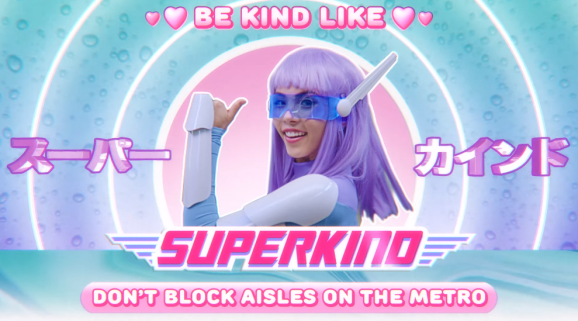
The City of Angels gets a new guardian of manners with the bilingual Japanese/English Super Kind series.
So when I heard that there’s a new series of bilingual Japanese/English videos encouraging people riding the Metro to mind their manners, I figured it was the latest etiquette awareness campaign from the operators of the Tokyo Metro subway system. The fact that the videos star a woman dressed as an anime-style magical girl made me even more convinced they must be a Tokyo Metro thing, given the organization’s decades-long penchant for weirdness.
But nope. It turns out that the Super Kind video series is actually about the Los Angeles Metro.
Each of the three videos produced so far opens with the appearance of Rude Dude, or Meiwaku Boy (meiwaku being the Japanese word for “nuisance” or “annoyance”), as the Japanese-language narrator calls him. Rude Dude is a fury monster who places his personal pleasure above anything else, even when using public transportation.
But Rude Dude’s lack of manners, such as clogging the aisle, making a mess with his snacks, or hogging extra seats, soon catch the attention of Super Kind (played by actress Anna Akana), who invariably finds herself thinking “Koko ha nantoka shinakucha!” (“I’ve got to do something about this!”). So she springs into action and undergoes an obviously Sailor Moon-inspired transformation sequence.
Super Kind’s opening attack is always to launch into a song, in English, imploring Rude Dude to be more considerate. While the musical performances seem like an homage to/parody of J-pop idols, the beat and choreography don’t really match up with current Japanese idol trends, although there’s a bit of a similarity to Hiroshima vocalist trio Perfume in the chiptune-like sounds.
But the musical interlude never manages to correct Rude Dude’s behavior, prompting Super Kind to Resort to more extreme, often super-powered methods.
▼ Super Kind’s second video, Eating
While the songs’ vocals are entirely in English, the series’ producers are surprisingly committed to the linguistic integrity in the videos’ Japanese-language components. Unlike many skits (regardless of country of origin) in which a foreign language is being used primarily for stylistic or comedic purposes, the Japanese narration in Super Kind’s videos has natural pronunciation and competent grammar. They were even astute enough to translate “kind” into kanji as 親切/shinsetsu (kind in the sense of considerate) instead of 優しい/yasashii (kind in the sense of tender-hearted), despite yasashii.
▼ Seat Hogging, Super Kind’s third, and so far final, video, in which she takes the bus instead of the subway
Despite growing up in Southern California, I’ve never used the L.A. Metro, so I can’t speak to how often literal monsters show up on the subway or buses. Still, years of living in Japan has taught me that public transportation is actually pretty awesome when everyone does what they can to make their fellow passengers’ ride a pleasant one, so hopefully Super Kind’s battle against Rude Dude and his ilk will end in victory for the champion of good manners.
Source: YouTube/Metro Los Angeles via IT Media
Top image: YouTube/Metro Los Angeles
Insert images: YouTube/Metro Los Angeles (1, 2)
Follow Casey on Twitter, where he wasn’t so sure about translating ボーイ as “dude” instead of “boy,” but changed his mind in light of the videos being meant for Southern California.